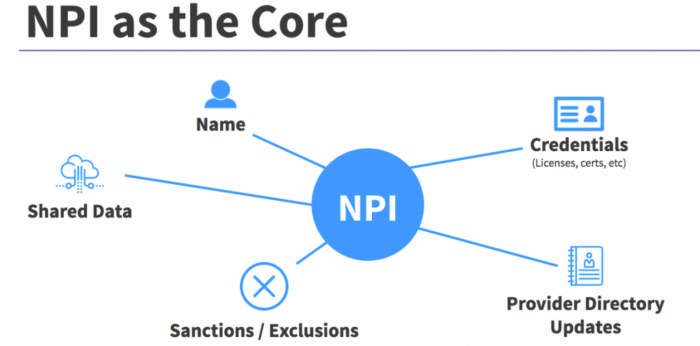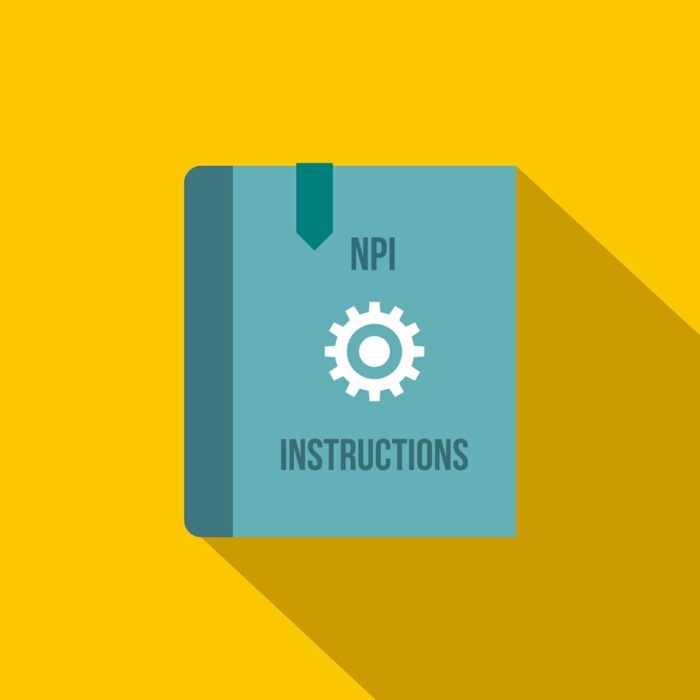
Healthcare providers in the United States are given a special identification number called the National Provider Identifier (NPI). In routine processes such as claim submissions, eligibility checks, and referral approvals, healthcare providers are identified using the NPI. All healthcare providers who are HIPAA-covered entities, such as doctors, dentists, nurses, and other healthcare professionals, are required to have an NPI.
The National Plan and Provider Enumeration System (NPPES) website offers an online form for the NPI. The application requests details like the name of the healthcare provider, their place of business, and any applicable taxonomy codes. Within a few days of submitting the application, the healthcare professional ought to receive their NPI.
It is crucial to keep the name, address, and taxonomy codes in the NPI registry accurate and up to date. Additionally, NPIs must be renewed every five years. Healthcare professionals should keep their NPI confidential and only divulge it to those who need it.
Let’s Get Into The Tips

Here are some tips for applying and maintaining your NPI registry:
Applying For An NPI:

⦁ Assess your requirement for a National Provider Identifier: Not all healthcare providers require one. Only those that bill Medicare or Medicaid or who are HIPAA covered entities are obliged to have an NPI.
⦁ Fill up the National Provider Identifier form completely: The National Plan and Provider Enumeration System (NPPES) website offers an online form for the NPI. Information like your name, business address, and taxonomy code(s) must be provided.
⦁ Application submission: You can submit the application electronically after you’ve finished it. Within a few days, your NPI ought to arrive.
⦁ Recognise taxonomic codes: Health care professionals are grouped into distinct categories according to their specialization or area of practise using taxonomy codes. When requesting an NPI, it is critical to precisely choose the relevant taxonomy code(s), as this data is used to locate and sort healthcare providers in the NPI register.
⦁ Keep information current: It’s crucial to keep the name, address, and taxonomy codes listed in the NPI register accurate and up-to-date. This makes it possible to find and reach healthcare providers for transactions with ease. Through the NPPES website, you can edit your information.
⦁ Renew your National Provider Identifier: In order to keep the registry’s data current and accurate, NPIs must be renewed every five years. About two months before your NPI expires, you will get a reminder to renew it.
⦁ Protect your National Provider Identifier: Healthcare practitioners should keep their NPI private and should only divulge it to those who need to know. Healthcare providers are identified in transactions by their NPIs, so it’s critical to protect this data from unauthorized usage.
⦁ Ask for support if necessary: There are resources available to aid if you require help with the NPI application process or have inquiries about keeping your NPI. For more information and assistance, call the NPI Enumerator at 1-800-465-3203 or go to the NPPES website.
Maintaining Your NPI:

⦁ Keep your information current: It’s critical to maintain the accuracy of your NPI information. Your name, address, and taxonomy codes are all part of this. Through the website for NPPES, you can change your information.
⦁ The National Provider Identifier must be renewed every five years, so do it today: When it’s time to renew your NPI, a notification will be sent to you. On the NPPES website, you can renew your NPI online.
⦁ Your National Provider Identifier should be secured since it contains sensitive information: Only divulge your NPI to those who have been given permission, such as clearinghouses or healthcare payers.
⦁ About Deactivation: It’s important to comprehend how it can be deactivated if their related information has changed or if they haven’t been utilized for a while. To prevent deactivation, it’s crucial to use your NPI frequently and keep your information current. You will have to reapply for a new NPI if yours is canceled.
⦁ Report any changes right away: It’s critical to notify the NPI register right away of any changes to your information, such as a change of address or a shift in your practice. This helps to prevent any delays or problems with transactions and guarantees that your information is valid and current.
⦁ Recognise how National Provider Identifier changes will affect your practice: Your practice may be impacted by changes to your NPI information, such as a change in taxonomy codes or an organization change. The impact of these changes on your billing and reimbursement procedures must be understood in order to make any necessary adjustments.
⦁ Prevention of Delays: In order to ensure that you are correctly identified as a healthcare provider during transactions, it is crucial to constantly use your NPI. This assists in preventing any delays or problems with the submission of claims or other transactions.
Some More Additional Tips

⦁ Stay up-to-date with National Provider Identifier regulations: NPI regulations and requirements may change over time, so it is important to stay up-to-date with any updates or changes. This can help you to ensure that you are in compliance with all regulations and requirements related to your National Provider Identifier.
⦁ About understanding the rules: The rules must be understood because they are frequently altered in the healthcare sector. This includes Medicare and Medicaid billing regulations as well as HIPAA regulations.
⦁ Use your NPI effectively: When making claims or carrying out any medical transactions, use your NPI appropriately. Two examples of ways to do this include using the proper NPI type (Type 1 or Type 2) and making sure your NPI is linked to the proper taxonomy code(s).
⦁ Take care when using your NPI: It’s important to monitor how your NPI is being used. Checking your Medicare or Medicaid billing reports is one way to ensure that your NPI is being used appropriately.
⦁ Ask for assistance if you need it: If you have questions or need assistance with your National Provider Identifier, there are tools available. Call the National Provider Identifier Enumerator at 1-800-465-3203 for more details, or visit the NPPES website.
Conclusion
Finally, establishing and maintaining your National Provider Identifier Record is a crucial part of working as a healthcare practitioner in the US. You can make sure that your National Provider Identifier is current and being used properly by adhering to these recommendations.








